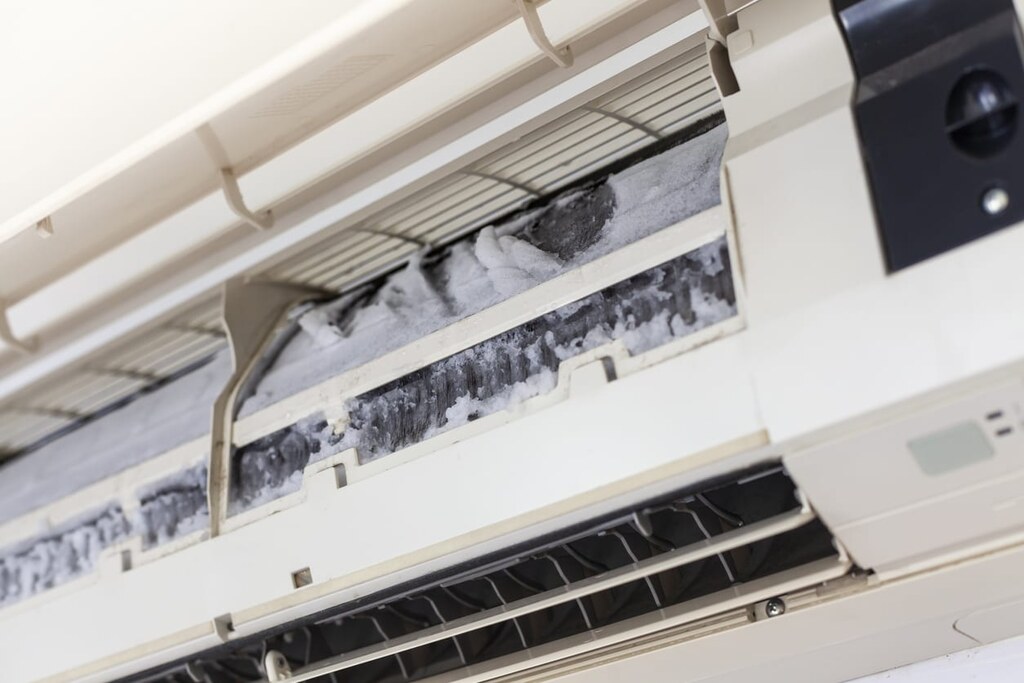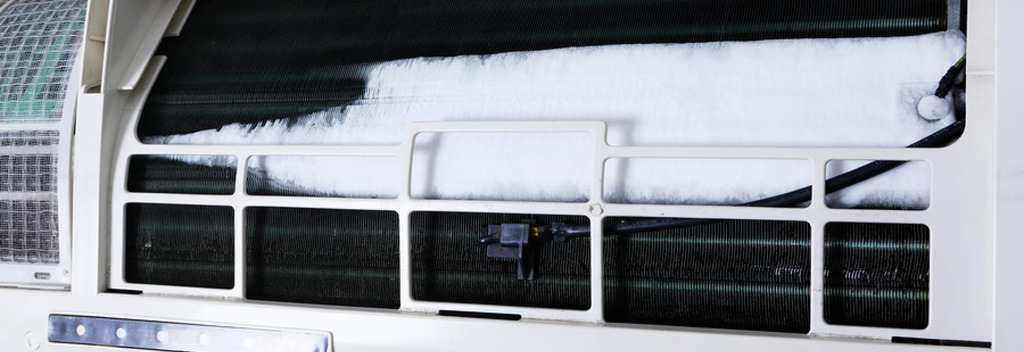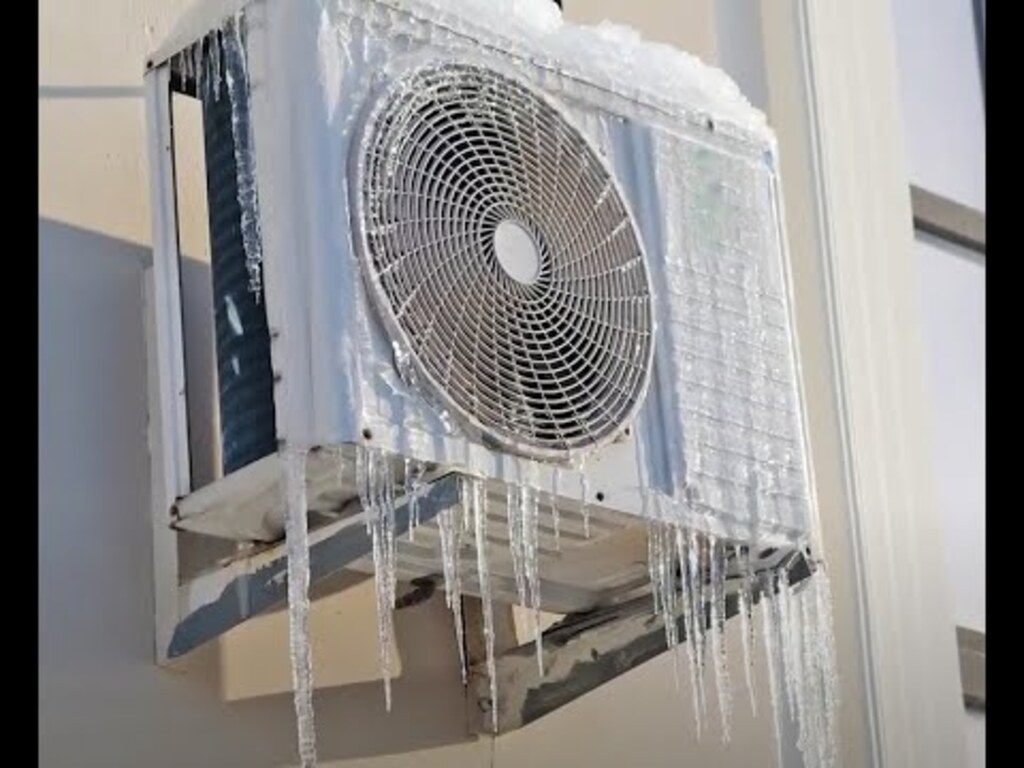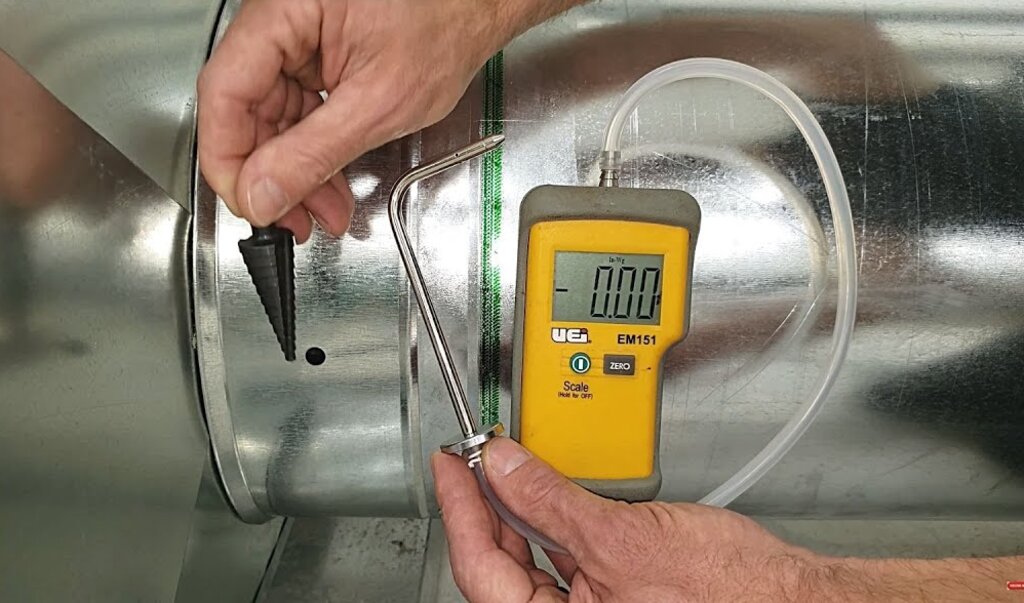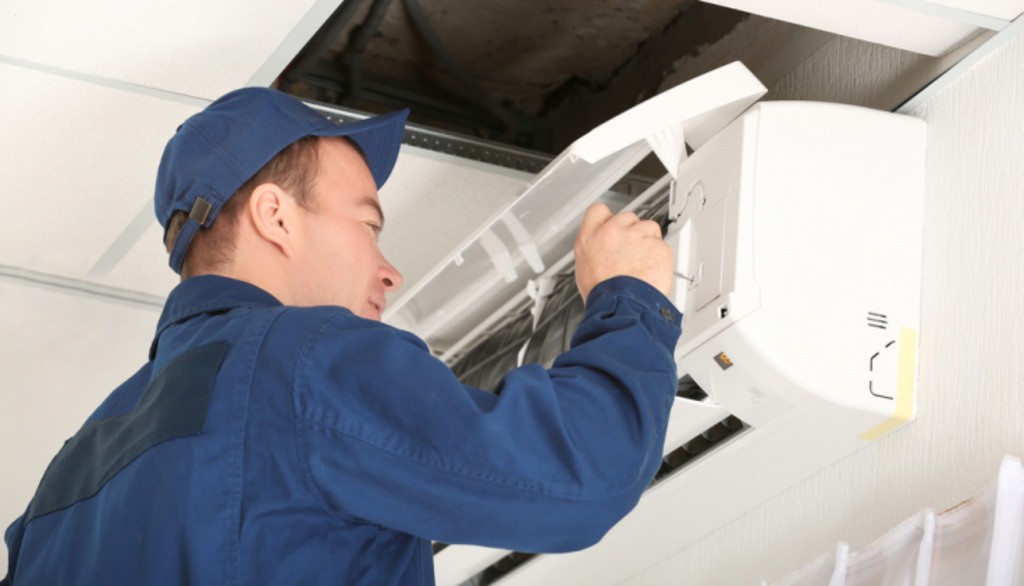In this blog, I’m tackling a frustrating yet common problem—your AC freezing up just when you need it the most.
It’s scorching hot outside, but instead of cooling your home, your air conditioner is covered in ice and barely working. Annoying, right? The good news is that this issue often has a simple fix! Whether it’s restricted airflow, low refrigerant, or a clogged filter, I’ll walk you through quick troubleshooting steps to get your AC back in action.
Keep reading to learn why your unit is freezing up and how you can solve it before the heat takes over.
Understanding Why Your AC Freezes Up
Your air conditioner is designed to remove heat from inside your home and push it outdoors.
The cooling process involves refrigerant, which absorbs heat from the indoor air and circulates it through the system.
For this to work efficiently, the right balance of airflow, refrigerant levels, and temperature regulation must be maintained.
When something disrupts this balance, the evaporator coil inside your AC unit can become too cold.
If the coil’s temperature drops below freezing, any moisture in the air will freeze upon contact, forming layers of ice.
Over time, this ice buildup prevents your AC from functioning properly, leading to weak airflow or even a complete shutdown.
If you’ve noticed your AC isn’t cooling as it should, it’s time to take action before the problem worsens.
What to Do When Your AC Freezes Up
If your air conditioner has frozen, the first thing you need to do is turn it off immediately. Letting it continue running in a frozen state can cause more damage.
The longer the ice sits on the coils, the more stress it puts on your AC, potentially leading to costly repairs.
Once the unit is turned off, you’ll need to allow it to thaw completely. This process can take anywhere from an hour to a full day, depending on how severe the ice buildup is.
To speed things up, switch your thermostat to the fan-only setting. This allows warm air to circulate over the frozen coil, helping it defrost more quickly.
While you wait for the ice to melt, place towels around the unit to soak up any excess water. As the ice melts, it can overflow the drain pan and create water damage if not managed properly.
Once everything has thawed, it’s time to figure out what caused the issue in the first place.
Common Causes of AC Freezing and How to Fix Them
A frozen AC can usually be traced back to one of a few common issues. Addressing these problems will help prevent future freeze-ups and keep your system running smoothly.
1. Restricted Airflow
Your AC relies on a steady stream of warm air passing over the evaporator coil to function properly.
If this airflow is restricted, the coil can get too cold and start freezing up. The most common culprit? A dirty or clogged air filter.
Air filters trap dust, pollen, and debris, preventing them from circulating through your home. Over time, they can become so clogged that they reduce airflow, causing your AC to struggle.
The solution here is simple—check your air filter and replace it if it’s dirty. Ideally, filters should be changed every 1-3 months, depending on usage and indoor air quality.
Another potential airflow issue could be blocked vents or registers.
In some cases, a buildup of dust and debris inside the ductwork can also contribute to poor airflow.
If you suspect this might be the case, consider having your ducts professionally cleaned.
2. Low Refrigerant Levels
Refrigerant is what allows your AC to cool the air.
If there’s a leak in the system and the refrigerant level drops too low, the pressure inside the coils decreases, causing them to become too cold and freeze.
Unlike air filters, refrigerant isn’t something you can simply top off yourself—it’s a closed system that requires professional handling.
If you suspect a refrigerant leak, look for signs like hissing noises near the AC unit, reduced cooling efficiency, or higher energy bills.
If any of these sound familiar, you’ll need to call an HVAC technician to inspect and repair the leak before recharging the system with refrigerant.
3. Dirty Evaporator Coils
Over time, dust and dirt can accumulate on the evaporator coil, preventing it from absorbing heat properly.
When this happens, the coil can get too cold and start freezing. If your AC is freezing up frequently, the coils might need cleaning.
To clean the evaporator coils, turn off the unit and remove the access panel. Using a soft brush or a vacuum with a brush attachment, gently remove any visible debris.
For a deeper clean, you can use a no-rinse coil cleaner, which is available at most hardware stores.
4. Thermostat or Temperature Issues
Sometimes, an AC freeze-up isn’t due to a mechanical issue but rather an environmental one.
If the temperature outside drops too low—particularly at night—your AC might not be able to regulate itself properly.
Most air conditioners are designed to operate within a specific temperature range, and if the outdoor temperature falls below 60°F, it can throw off the system.
If you live in an area where summer nights get particularly cool, consider installing a programmable thermostat.
This allows you to set a minimum temperature threshold, automatically turning off the AC when it gets too cold outside.
If you don’t have a programmable thermostat, just make it a habit to turn off the AC and open your windows when the temperature dips.
Preventing Future AC Freeze-Ups
Now that you’ve fixed the problem, you’ll want to make sure it doesn’t happen again.
Regular maintenance is key to running your air conditioner efficiently and preventing unexpected freeze-ups.
Start by checking and changing your air filter regularly. This is one of the easiest and most effective ways to keep your AC in top shape.
A professional technician can check for refrigerant leaks, clean the evaporator coils, and ensure all components are functioning properly.
Keep an eye on your thermostat settings, and be mindful of night time temperatures. If you notice your AC struggling on cooler nights, adjust your settings accordingly.
Lastly, make sure your vents and registers are clear of any obstructions.
Good airflow is essential for preventing ice buildup, so take a quick look around your home to ensure nothing is blocking the air from circulating properly.
When to Call a Professional
If you’ve gone through these steps and your AC continues to freeze up, it’s time to bring in an expert.
Some issues, like refrigerant leaks or mechanical failures, require specialized tools and knowledge to fix.
An HVAC technician can diagnose the problem, make any necessary repairs, and get your system running smoothly again.
Ignoring a freezing AC can lead to bigger problems down the road, including compressor damage and costly repairs.
So if you’re unsure about what’s causing the issue, don’t hesitate to call a professional for help.
Conclusion
A frozen air conditioner can be frustrating, but it’s a common issue with fairly simple solutions. By understanding why your AC is freezing and taking the right steps to fix it, you can restore cool, comfortable air to your home in no time.
The key to preventing future freeze-ups is regular maintenance and staying aware of any changes in your system’s performance. With a little care and attention, you can keep your air conditioner in great shape and avoid dealing with unexpected breakdowns when you need it most.
FAQs
How long does it take for a frozen AC to thaw?
It depends on the severity of the ice buildup. A light freeze may thaw in an hour, while a heavily frozen coil can take up to 24 hours. Turning on the fan-only mode can speed up the process.
Can I pour hot water on my frozen AC to melt the ice?
No, using hot water can cause sudden temperature shocks, potentially damaging the coils. Instead, turn off the AC and let it thaw naturally, or use the fan setting to speed it up.
Why does my AC keep freezing up at night?
If outdoor temperatures drop too low, the system may struggle to regulate itself, causing the coils to freeze. Try setting the thermostat a little higher or turning off the AC at night when it’s cooler outside.
Can a dirty air filter cause my AC to freeze?
Yes! A clogged filter restricts airflow, making it harder for the system to absorb heat properly. This can lead to the evaporator coil getting too cold and freezing over.
When should I call a professional for a frozen AC?
If your AC keeps freezing despite cleaning the filter, checking airflow, and letting it thaw, it could be a refrigerant issue or a mechanical failure. In that case, it’s best to call an HVAC technician.

